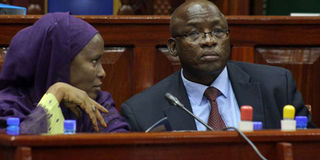Six misses in proposed election laws

Senator Fatuma Dullo (left) and Baringo North MP William Cheptumo - chairpersons of the parliamentary ad hoc committee handling the proposed changes to the election laws - talk during proceedings at Continental house, Nairobi, on October 4, 2017. The amendments are being endorsed by Jubilee lawmakers. PHOTO | DENNIS ONSONGO | NATION MEDIA GROUP
What you need to know:
- If passed, the amendments will undermine transparency and accountability in the use of public resources.
- Three, the law is silent on the transparency of tenders and contracts, yet this is one of the biggest challenges.
The Election Offences (Amendment) Bill, 2017 and the Election Laws (Amendment) Bill, 2017 introduced in the National Assembly have been the subject of public discussion, examination and input.
The debate has mainly focused on the Election Laws (Amendment) Bill.
Few, if any, have discussed the proposed changes to the Election Offences Bill.
ACCOUNTABILITY
Though important, the debate has missed two critical issues.
First, is the accountability of public funds by state officers and agents as the Independent Electoral and Boundaries Commission prepares to conduct a fresh presidential election.
There are no attempts to check the misuse of public resources.
ADVERTS
The existing law empowers the IEBC to impound or order the seizure of state resources unlawfully used in an election campaign.
The IEBC turned a blind eye to this as the government ran an advertising blitz on television during the election period.
Given the illegalities committed when the Presidential Delivery Unit ran the adverts, some which are still on display in public places today, the proposed amendment seeks, in effect, to do two things.
One is to legitimise the illegalities that saw the national government spend undisclosed sums of money.
Two, it seeks to encourage advertising as we go for the fresh presidential election.
IEBC
Following the Supreme Court nullification of the August 8 presidential election, and the challenges acknowledged by the IEBC in conducting elections, then what major legal lacuna exists that might prevent the holding of a simple, accurate, verifiable, secure, accountable and transparent election on October 26?
How can the IEBC enhance transparency as it seeks to ensure it complies with the Constitution, especially Article 35?
The proposed amendment seeks to repeal the law that banned the government from publishing advertisements of its achievements during the campaign period.
INFORMATION
This proposal is mischievous as it claims that it wants to ensure that the law conforms to Article 35 of the Constitution, which provides that every citizen has a right of access to information held by the State.
This is ironical as the State has not developed regulations required by the Access to Information Act, 2016 more than a year since it was enacted.
Second, it does not spell out which important information will be restricted if it is not relayed as advertisements of achievements of the government.
There are six areas in which the proposed changes miss the transparency they purport to seek to enhance as required, not only by Articles 10 and 35 of the Constitution, but by also many international instruments that Kenya has signed to.
PUBLIC RESOURCES
If passed, the amendments will undermine transparency and accountability in the use of public resources and hamper the IEBC’s ability to ensure a level election playing field.
They will also commoditise elections into a prize for those with the largest amounts of money.
Two, the law seems silent on how the IEBC and its officials can hold open meetings — a prerequisite to transparent decision making.
If the law had a provision that requires IEBC officials to hold open meetings, then they would more likely make decisions based on objective and justifiable reasons.
CORRUPTION
Three, the law is silent on the transparency of tenders and contracts, yet this is one of the biggest challenges.
Restricted procurement more often than not entrenches opacity and corruption.
Four, given that the Supreme Court ordered access to certain sets of information and logs on IEBC servers, any law that seeks to protect transparency while protecting the rights of voters should have made clear provisions on how legitimate interests of transparency would be balanced against the rights of voters to the protection of their personal data.
Five, while the proposed law seeks to sanction election officials who fail or refuse to complete, sign, submit or falsify election documents, it is silent on those who fail or refuse to provide and or make public election documents.
SHORTCOMING
It also only seeks to punish presiding or returning officers. This is discriminatory.
Six, the proposed law does not require the IEBC, its officials and agents to release all election result forms to the candidates and the public and to sanction any denial, refusal or delay.
In sum, the Election Offences (Amendment) Bill fails to meet its stated principal objective – to enhance access to information and ensure transparency.
It purports to ensure implementation of a constitutional imperative but does not.
It must be overhauled or thrown out in totality.
Mr Maina is the Regional Director, Article 19 Eastern Africa. [email protected]




